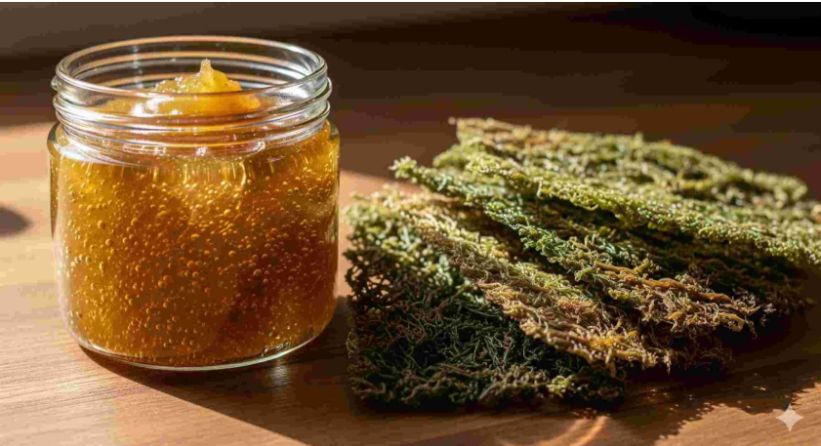
Managing diabetes involves careful attention to diet, exercise, and lifestyle. Lately, natural supplements like sea moss have been gaining attention for their potential health benefits, particularly for blood sugar control and overall wellness. But is sea moss really good for diabetics? Let’s explore the science, potential benefits, and important precautions to consider.
What is Sea Moss?
Sea moss, also known as Irish moss or Chondrus crispus, is a type of red algae found along the Atlantic coasts of Europe and North America. Traditionally used in soups, teas, and skincare, it is packed with nutrients including:
- Minerals: iodine, magnesium, zinc
- Vitamins: B vitamins, vitamin C
- Fiber: soluble fiber known as carrageenan
- Antioxidants: polyphenols and flavonoids
This unique combination of nutrients has led many to explore sea moss as a supplement for various health goals, including energy support, immunity, and potentially diabetes management.
How Sea Moss May Help Diabetics

1. Blood Sugar Management
One of the key benefits of sea moss for people with diabetes is its high soluble fiber content. Fiber slows down digestion, which can help reduce spikes in blood sugar after meals.
Additionally, compounds like fucoxanthin in seaweed have been linked to improved insulin sensitivity in preliminary studies. This means your body may respond better to insulin, potentially aiding in glucose control.
2. Supports Insulin Function
Sea moss contains essential minerals such as magnesium and zinc, which play crucial roles in blood sugar regulation. Low magnesium levels have been associated with increased insulin resistance, while zinc contributes to proper insulin production and secretion.
3. Aids in Weight Management
Maintaining a healthy weight is vital for managing type 2 diabetes. Sea moss is low in calories but rich in fiber, which promotes satiety and helps prevent overeating. Feeling full for longer can support weight loss or weight maintenance, indirectly helping to control blood sugar levels.
4. Promotes Heart Health
People with diabetes face a higher risk of cardiovascular issues. Sea moss contains omega-3 fatty acids and antioxidants that may help lower blood pressure and cholesterol, supporting overall heart health.
5. Supports Thyroid Function
The iodine in sea moss is essential for thyroid hormone production. Healthy thyroid function is closely linked to metabolic health and blood sugar regulation, making this nutrient particularly relevant for diabetics.
Quick Comparison Table: Sea Moss Benefits for Diabetics

| Benefit | How It Helps Diabetics | Key Nutrients | Notes |
| Blood Sugar Control | Slows glucose absorption, reduces spikes | Soluble fiber (carrageenan) | Helps maintain stable blood sugar |
| Insulin Sensitivity | Improves insulin response | Magnesium, Zinc | Supports proper insulin function |
| Weight Management | Promotes satiety, aids in calorie control | Fiber | Helps reduce overeating and support weight |
| Heart Health | Lowers cholesterol and blood pressure | Omega-3 fatty acids, antioxidants | Reduces cardiovascular risks |
| Thyroid Support | Regulates metabolism and energy balance | Iodine | Important for diabetics with thyroid issues |
| Antioxidant Protection | Reduces inflammation and oxidative stress | Polyphenols, flavonoids | May prevent complications from diabetes |
Important Considerations and Risks
While sea moss shows promise, it’s important to approach its use cautiously, especially if you have diabetes.
Limited Evidence
Most research on sea moss and blood sugar is preliminary, often involving animal studies or studies on other types of seaweed. While its nutrient content is beneficial, sea moss should not replace prescribed diabetes medication.
Risk of Iodine Overdose
Too much iodine can harm the thyroid and affect metabolic health. Overconsumption of sea moss, especially concentrated gel or supplements, may lead to thyroid dysfunction.
Contamination Risk
Depending on its source, sea moss may contain heavy metals like mercury, arsenic, or lead. Choosing a reputable brand that tests for contaminants is essential.
Drug Interactions
Sea moss may interact with blood thinners or other medications. Always check with a healthcare provider before adding it to your routine.
How to Safely Include Sea Moss in Your Diet

- Start Small: Introduce a small dose of sea moss gel (1–2 teaspoons daily) to monitor your body’s response.
- Monitor Blood Sugar: Check your glucose levels closely when adding any new supplement.
- Choose Quality Products: Opt for brands that test for heavy metals and provide organic or wild-harvested options.
- Consult Your Doctor: Especially if you have thyroid issues or are on medication, get professional guidance before incorporating sea moss regularly.
How Sea Moss Works Compared to Other Diabetes Supplements
| Supplement | Key Benefits for Diabetes | Pros | Cons |
| Sea Moss | Fiber, minerals, antioxidants | Supports blood sugar, heart health, thyroid | Limited human studies, contamination risk |
| Cinnamon | Improves insulin sensitivity | Easy to use, widely available | Mixed study results, taste issues |
| Fenugreek | May slow glucose absorption | Can reduce post-meal spikes | Strong flavor, may cause digestive upset |
| Bitter Melon | May help regulate glucose | Traditional remedy, widely studied | Can interact with diabetes medications |
| Alpha-lipoic acid | Reduces oxidative stress, may improve insulin function | Antioxidant benefits | Requires supplementation, cost |

FAQs About Sea Moss and Diabetes
Can sea moss cure diabetes?
No, sea moss is not a cure for diabetes. It may help support blood sugar control as part of a healthy lifestyle but should never replace prescribed treatments.
How much sea moss should a diabetic consume?
Start with 1–2 teaspoons of gel per day. Gradually adjust while monitoring blood sugar and overall tolerance.
Is sea moss safe for type 1 and type 2 diabetes?
Sea moss can generally be included in both types, but consultation with a healthcare provider is essential, especially for type 1 diabetics who rely on insulin.
Can sea moss affect thyroid health in diabetics?
Yes, its iodine content supports thyroid function, but excessive intake may lead to thyroid issues. Moderation and quality sourcing are key.
Are there any side effects of taking sea moss?
Possible side effects include iodine overdose, digestive upset, and contamination-related risks. Stick to recommended dosages and trusted brands.
Final Thoughts
So, is sea moss good for diabetics? The answer is yes, with caution. Its rich fiber, mineral, and antioxidant content may help support blood sugar regulation, insulin sensitivity, heart health, weight management, and thyroid function. However, it is not a replacement for medical treatment, and its benefits for diabetes require more human research.
When used responsibly—as part of a balanced diet and diabetes management plan—sea moss can be a valuable, natural supplement. Many people also wonder when is the best time to take sea moss for maximum benefit; while there’s no strict rule, consistency and moderation are key. Start small, monitor your response, and consult your healthcare provider to safely enjoy its potential benefits.


